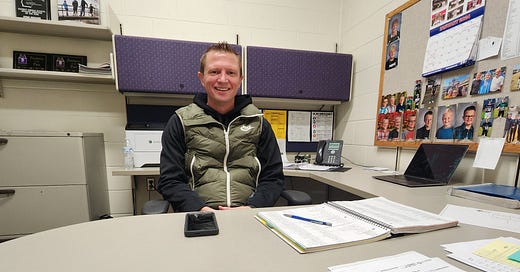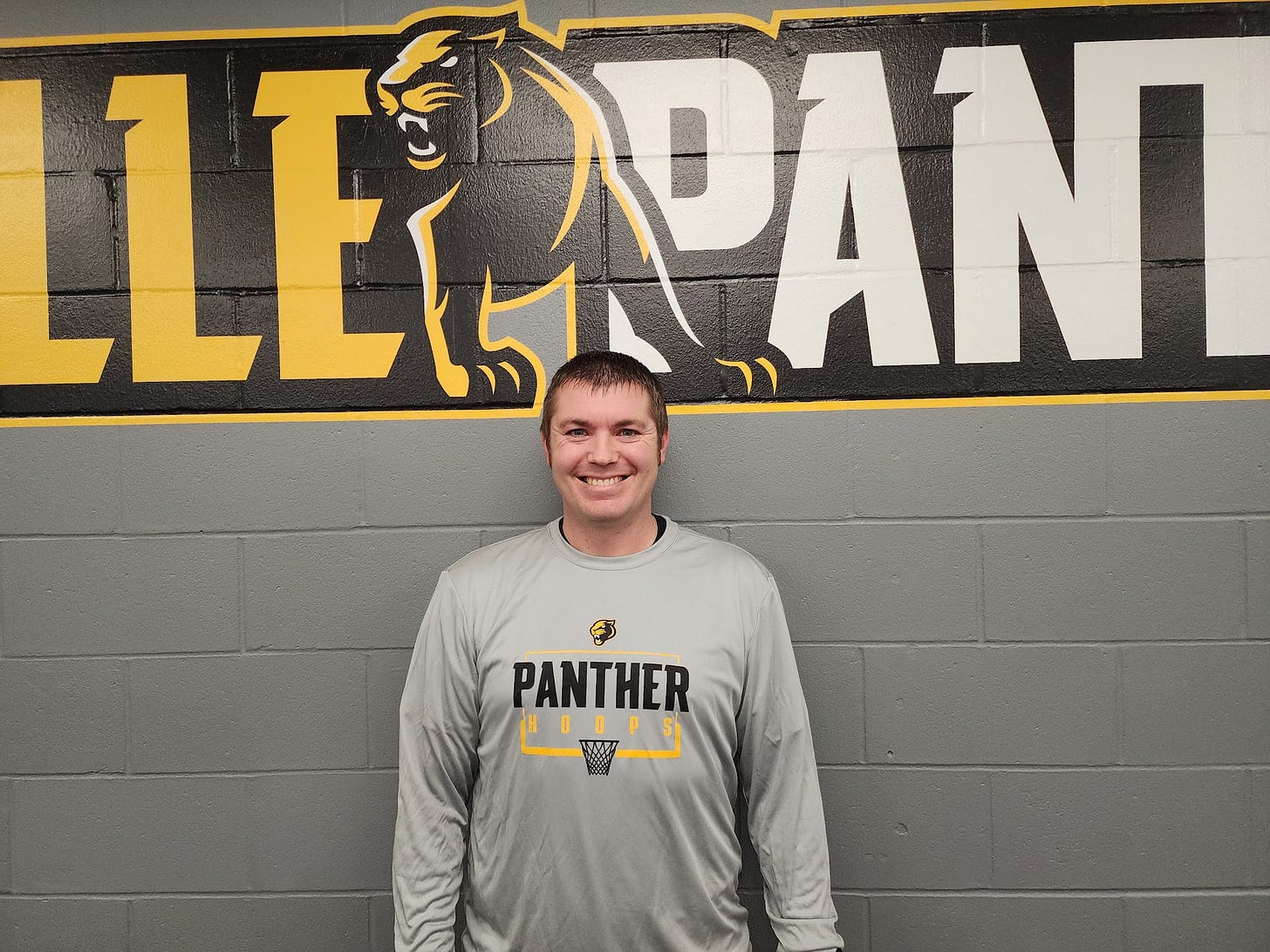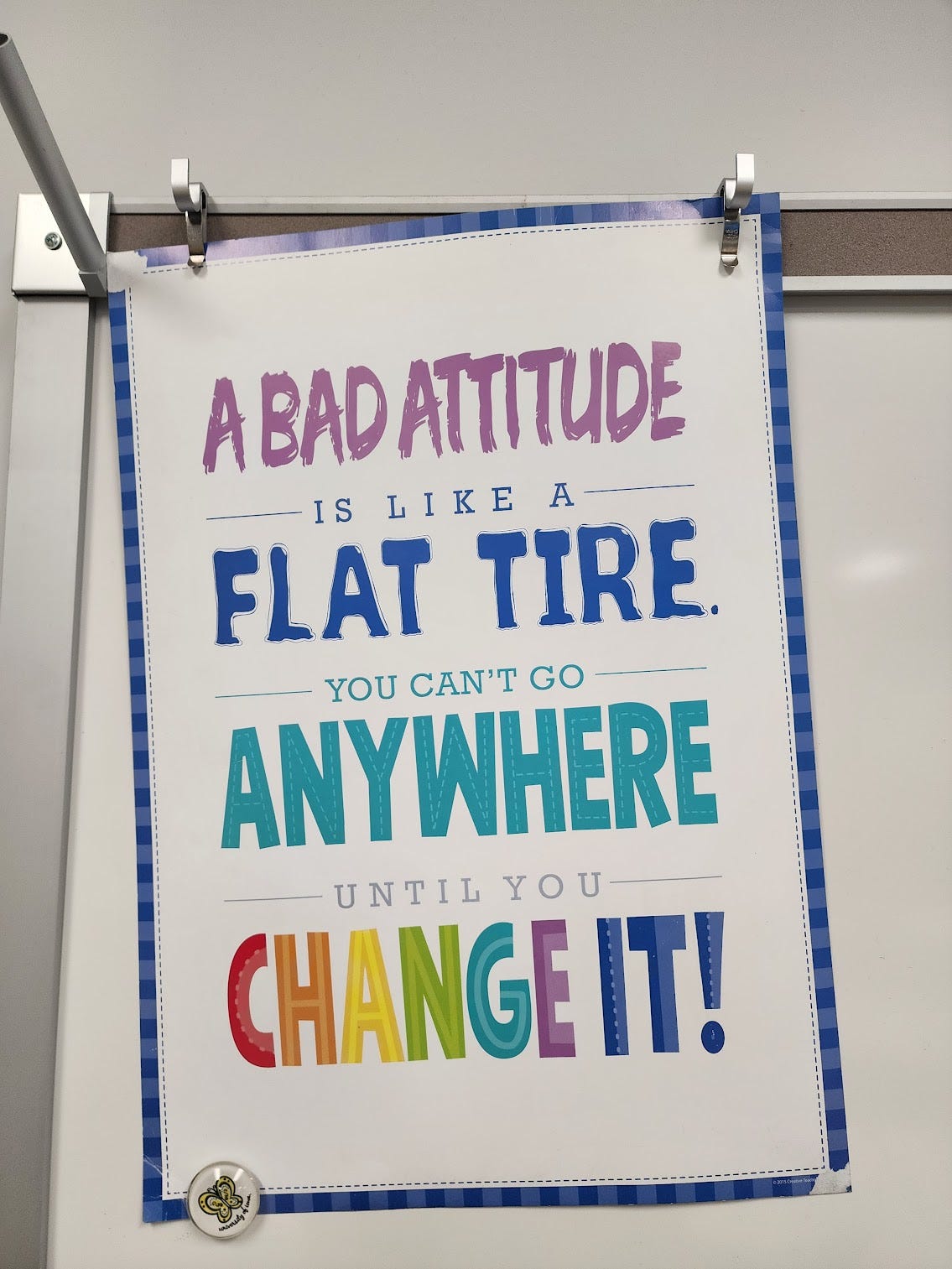Knoxville Activities Director Ryan Paulsen is a busy man, always on the move. I know about what I actually see him do at activities and events, but I also know that there is much more to his job than is visible, so I asked him about it. As you can see above, he is an organizational dynamo, and he shared more about his work below. The audio of the interview is below, as is a partial transcript of our conversation.
Mr. Paulson, what's involved with being the Activities Director at Knoxville?
Well, there are a lot of different things on an activities director’s plate. You've got kind of a mix—there's things that need to be done every day; just day-to-day operations stuff. There are projects that you're looking at that are more short-term, that need to be tended to, there are long-term projects that you are working on, and then if we're hosting an event all the logistics that have to be pulled together making sure we've got gate workers, gate box concessions group, making sure the officials know what the plan is for the day and then if you've got weather that factors into that, there's a lot of communication that is involved between the opposing school or schools.
And then you get to the actual setup of the event, administrative management of the event, making sure officials get to where they need to get, making sure… all of those things are running smoothly, and then when the event’s over, it's tear down, put away stuff…when you have a game on a day that takes up a lot of the time during the day, and then sometimes in the fall, we've got two or three events going on at the same day, in the winter maybe we've got middle school basketball and high school basketball on the same day, and then in the spring when you've got so many sports in such a tight scheduling window from early April, late March-ish to mid-May, you might have two, three, four events on the same day. And so when you have an event on a day it takes up a lot of the day.
While you're also trying to respond to emails…and try and chip away at those short-term, long-term projects, and then sometimes you have something that comes up that requires immediate attention, and you drop everything and have to do that…and so those other tasks are waiting for you when the immediate need is taken care of, so it can vary from day to day.
I absolutely love my line of work here. I love working at Knoxville. I love working for our kids, coaches, and programs. There are certainly a lot of things to do and a lot of time but I don't really consider this work because I love what I do and I love coming to work every day.
It seems like your schedule just must be crazy. I mean you have to be here at different times, sometimes late into the night and I see you at not only sporting events but the musical and other performances. Does it feel like you can never get everything done?
That's a great point, Bob. This is my 20th year in education and my 18th year as an AD and so you're absolutely right. It is a constant—you're constantly chasing trying to get everything done. I've got a really detailed to-do list today that I want to get to in a perfect world. I want to get every single thing done on there. It's not possible. It's just there's just not enough time in the day to get it all done. So what I've had to really try and get good at is prioritizing and knowing exactly what needs to get done when, and then giving it my best effort to get it done and you just kind of repeat that on a daily basis, until you can try and get it all done and it's a never-ending process of constantly chasing all the things that you try to get done. But when you're super competitive like I am—I take a lot of pride in crossing things off every day and there's always something to do for sure.
How do you avoid dropping balls all the time?
Everybody has their own process and my process is I write everything down. I could tell you some things from memory-wise—tell you what happened in a Chicago Cubs game in 1998. So I've got a really good memory, but I always write every single thing down just so that we aren’t dropping the ball. I want to make sure that everything is accounted for because there might be things that are told to you, like hey, can you do this, can you do that, and it's really easy when you get a high volume of topics or a high volume of things on your to-do list, and if you're not writing it down it's really easy to forget those or drop the ball, and so I write everything down. I keep my planners from year to year. And one of the things on my to-do list every day is to look back. What did I do one year ago today just to make sure that nothing is falling through the cracks...let's say a high school basketball game or a high school wrestling meet everything that needs to happen happens and it happens smoothly and basically, all of the T’s are crossed and I’s are dotted so that things can be pulled off seamlessly. That's my goal because I want things that we do to be high quality and I like to have attention to detail. I mean when I was an athlete in high school and college, I learned very quickly just how important the value of preparation is and and being ready because how prepared you are and how much effort you put into that, that's something that you have control over and I try and put a lot of effort into the things that I can control and I try not to worry about the things that I don't have a lot of control over.
It wasn't that long ago when I saw you, I think it was at a middle school wrestling meet. It was here. I think you're running three mats and I was watching you and watching sort of how it worked and it came to me that you were like a conductor— that all of us and everybody from the crowd, to the athletes, to the refs, to the scorekeepers, to all of it had to work together and you were moving around. I don't know if you even got to watch any wrestling, but you were the conductor. Is that how you see it?
In certain aspects yes, I think that it was a middle school wrestling meet that you reference. We had it was a pretty big meet…We also had Middle School girls basketball going in the other gym and I kind of liken it to hosting a track meet, when we get to the actual track meet a lot of the work that I've done has already been done as far as making sure that we have everything needed for that track meet or for in this instance like putting together, getting ahead of time all the other team’s rosters that have their kids ranked on the one to five scale—what's their weight? What's their gender, and then sitting here in my office and putting together matches—putting together 150 matches and making sure that we have three mats. We've got four officials. We've got three score tables. We've got three sets of score table workers and so once we get to the actual meet a lot of stuff that I've done is done and then it's just about game management making sure that if there are any fires that pop up, to get those put out, are the matches running smoothly or that don't we have in any technical issues with Track Wrestling, bouncing back and forth between gyms to make sure that girls basketball game is going okay and wrestling is going okay.
So yeah, and that's kind of what I was alluding to with the track meet. It's very similar, it is a lot of being a conductor. You need a lot good help to be able to pull off events that involve, like a wrestling meet or a track meet that have multiple teams. But you know, that's part of the stuff that I find fun, and I enjoy doing, and sure it can be daunting. But if you are prepared and know what needs to get done and you're competitive about wanting to do things really well. And if you have really good help you can pull off those things.
Now one of the things that I like about Knoxville, and I liked when our kids were here is that there are so many activities that the kids can participate in, things that are in their interests or they can try new things. There's a place for everybody to do something…and it's just like it's the right size. There are so many opportunities to do things. I've got a buddy who went to a big school in Minneapolis. He's 6’4”, 250 pounds. I feel he could have been a great football lineman. He didn't even try out. He knew he didn't have a shot. And it's like everybody has a shot here at whatever they want to do.
So I'm really thankful that in my six years here….we've been able to expand program offerings with the support of the administration, with the support of the board. To be able to have a very diverse catalog of extracurricular offerings…and we pride ourselves here in Knoxville is making sure that kids are having a good experience but getting ready for that next step acquiring the skills that they need for whatever their next step is, maybe their sophomore year or when they're after their senior year going on to their college career or military, the skills that that kids need.
Activities are an unbelievable platform to learn those life skills, and just the more activities that you can offer the more opportunities it is for people to find something that they are interested in, and the more kids are involved in extracurricular activities the more connectivity they have to their school, the more pride they have in school, the more chances they're getting at working on those life skills of managing their time…understanding what it means to be part of a team. How do you deal with success? How do you deal with failure? How do you go about preparing yourself for practices and competitions/performances? So yeah, I'm really thankful that we've been able to do that, because like you said, there is something for everyone and the more that we can get kids involved the better.
The Knoxville Athletics Hall of Fame induction luncheon was held Friday at the National Sprint Car Hall of Fame and Museum.
Among those honored were the 1981 volleyball team, all-state football player Bob “Tubby” Vander Linden, Panthers football standout Bill Awtry, and all-state baseball player Scott Hoch. The inductees were also honored between the girls’ and boys’ basketball games Friday evening.
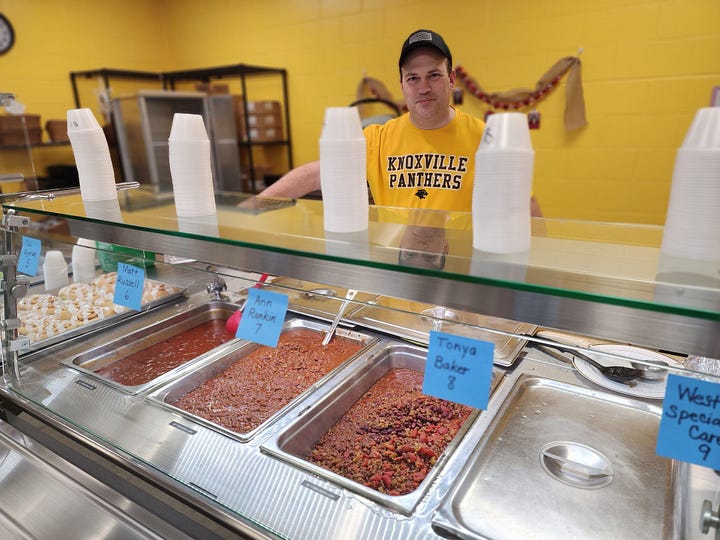
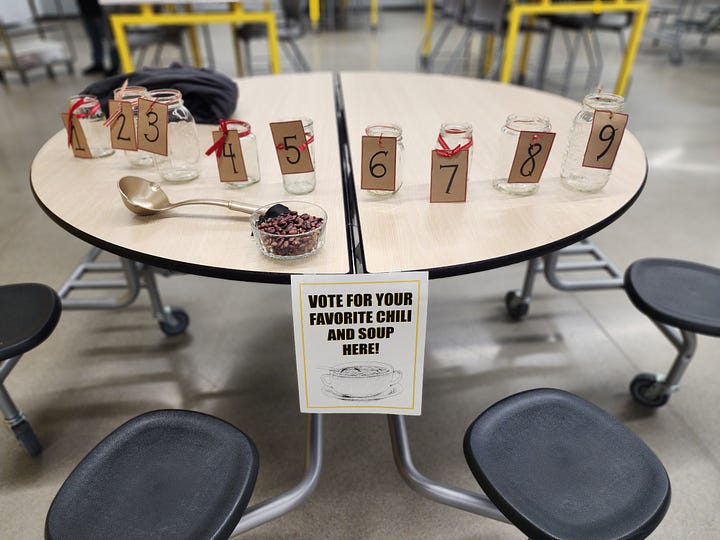
Above are some shots of the chili and soup contest before the games.
Another person in the district I see everywhere engaging with students is Tyler Pearson, College and Career Readiness Coordinator. I wanted to learn more about all of the opportunities the Knoxville School District provides to help students as they enter the next part of their lives. Mr. Pearson also shares how Jim Uitermarkt is helping with career readiness. Here is our full interview, and a transcript below.
Tyler for a few years now, I've participated in career day you've coordinated—people from all over the county and beyond to present to students, to interact with students about potential careers. I didn't have anything like that when I was in school, but I tell you I was honored to be a part of it. It was great fun. I think it's a really important thing for our students to have an opportunity to participate in, and I know your job is bigger than that. Can you tell us a little bit about what you do?
So the event you're describing is just our career week. We do that for our high schoolers, all of our students 9 through 12th grade get to come for one or two days, just kind of depends on the year and they sign up for sessions. So traditionally kids don't know about a lot of jobs that exist outside of their household or their family. So this is a great way for them to hear firsthand from people that do all different jobs from all different walks of life and different trainings to get there and education to get there.
Let them learn about what's out there. So they get to sign up for the sessions they're interested in and go and learn more about and ask questions. We are strategic about who we invite to that day. We have six different career clusters that we target and a ton of different subcategories within those career clusters, but I think we ended up with 86 different presenters from a variety of different places and it's a great way for the kids to hear more about that career they think they're interested in to decide—do I want to keep going that direction or did I get feedback that day or hear something in that presentation that maybe I want to pivot and go a different direction, as either way is a great experience for the kids.
So yeah, career week is one piece of my job. There are a lot of other things that go into it, but from the elementary age we're looking at guest speakers. We're looking at field trips to go on, we're looking at doing kindergarten signing day, to get the kids excited about it and you're in kindergarten now, but where do you want to be when you graduate from high school and one of my challenges with my job is how do I layer experiences from that early age to when you're graduating high school to help you figure out what you want to do. Once I decide maybe I think I have want to do this thing or do this career. How do I get there? Is there a two-year degree needed a four-year degree needed? Can I go straight to the workforce and do that? Where do those jobs exist? Are they here in Iowa? Are they in Knoxville? Are they Marion County? Where can get a job and what do I make doing it? What kind of lifestyle would I live? So that's that challenge I have right now with myself and then I get to work with great educators and great people in our community to help the kids pull that off. So I consider myself kind of that middle man between the community and the students to match them up with experiences to help them figure out what they do with their lives.
So how I was envisioning it as you were speaking there, it's like you're there and you open doors for students that didn't even know that the door existed, let alone where it was. That's what you do.
That's exactly it. And I'd say when we I started, I guess this is my fourth year in this position. We wanted to see what other schools do in relation to career and college readiness. And how do we want that to look at Knoxville? So I did a lot of looking in the mirror at what we do well and looking at other schools and what do they do to prepare their kids and we decided we wanted to figure out how to meet kids where they are with their interests.
There's other districts around the state that say, hey, we have these five things that we specialize in, pick one of those five and we'll help you get there and we didn't want to tunnel kids into one of those five choices. We said what are the kids interested in no matter how exotic it is and how can we get them to where they want to go? So we developed a program called Opportunity Knocks and it just goes back to what you just said. How do we open doors for them? How do we open opportunities for them they can choose to pursue it or say no that one's not for me right now, maybe later or maybe I'll wait for another opportunity to come up. So our Opportunity Knocks is kind of our K-12 vision of what that looks like from our elementary to our Middle School to High School and how it goes from exposing them to different careers to learn about themselves, to actually give them experiences in those things they're interested in.
Yeah, it's just remarkable in your relationship with different people in the community. Employers from the largest manufacturers to small retail shops. I mean those connections are just right there and the people of Knoxville want to help—they want to be there to help the kids.
Yeah. Knoxville is an amazing place to live and work and you hear it everywhere, why I choose Knoxville, because of the people. The people are always doing anything they can to help somebody else out and that's very true for my job too. So you talk about building community partnerships—we have students that go on field trips to learn about different manufacturing opportunities or how does the water get clean and we have field trips and in seventh grade, they go to the water treatment plant. They go to the landfill, and they learn about all these different things that exist but it also goes back to I need a speaker to come and during reading during the week. Okay, who can we tap into for that? I can be that middle person for the teacher when they don't know who to ask.
Where to start? I have this giant list of people—let's ask them if they're willing to help out but it also goes back to we have need sometimes and we need community support to pull them off. So in the past, we had a CNA program and then just two years ago we brought that back through a partnership with our local hospital. So the Knoxville Hospital provides a couple of instructors and we've had 20 kids go through that—almost half of them are employed at the hospital now, so that is a win-win for us and for them—another great partnership we have is with the city of Knoxville and through Weiler. We have students that build projects and our Advanced Manufacturing class and they design them from design on the computer to end product and get feedback from the chamber and the city. Part of that class is getting those kids experiences in manufacturing.
Maybe they think they’re interested in maintenance or welding or powder coating or being a machinist or whatever job that is. Mr. Sanger works with Weiler to give them an experience where they go there and they job shadow for two or three weeks and see what the day in the life of those people is like so it helps the kids know before they graduate from high school even what's that job? Like what do I need to do to get to that job? Does it exist here in Marion County? And they do all that before they graduate so they don't go to college and spend money on something they don't think they're actually interested in because they've tried it they know what's for them. They know what's a great match for them. So the community partnerships that exist here in Knoxville are amazing.
And so what happens then is the learning is beyond the building and they just have dozens of more mentors out there opening doors for them, too.
Yes, not only opening doors. But like when you think of another part of my job with scholarships, so I'm one of the point people in our district for organizing community scholarships and I serve on the Panther Scholarship Foundation.
When a student makes that connection to that mentor, someone in the community, they want to give back, they want help that kid get there. So we have tons of generous donors in Knoxville that say, hey you're at your senior year, you've identified this place you want to go to get this extra training. How can we help you get there, and they sponsor scholarships for these kids and give back and so many different ways, from internships to scholarships to potential employers down the road, and if I can make that connection now in high school, you might know somebody that can help me get a job, even if it's not with you, so it's truly phenomenal.
Anything else that you do that you'd like to highlight today?
I'd say the last two years, we started a new class called work-based learning and that is a way for me to be a co-teacher. We have another teacher here Mrs. Donovan and we teach this class called work-based learning to students where they come in and they do a little bit of course work, but then the focus is getting them out in the community and trying out different jobs.
So we've helped kids get experiences. And when I talk about exotic jobs that most schools don't offer this class meets those needs. So we have a student that graduated a couple of years ago, our first that ever took the class that was interested in cosmetology. If you wanted to be a hairstylist what high schools do anything with hair styling to help them get prepared to try that out—it doesn't exist. So we got her three different opportunities in our own community where she can go to three different salons, see how they run their business, see how they rent out the other chairs and booths in their office, how they do it the day-to-day stuff so she could decide if that was for her. Well, she went on to get her degree and now she's cutting hair for a living.
We have other kids that go into it wanting to learn more about teaching and we started a teacher apprenticeship program. We have kids that want to learn more about prosthetics. So we get them to experience two different prosthetics places from one where they manufacture and build them to one where they fit them. We have kids that are interested in working in a hospital setting. They don't know what kind of job in a hospital and our community partner here at the Knoxville Hospital lets them have different experiences to see what area of the hospital they want to work in, from being a nurse to a doctor, to the business side of the hospital and it's just phenomenal.
So I would just highlight our community is awesome in that they work with our kids and I just get to play a small role in helping match those opportunities up for the kids and employers. It's a win-win for everybody, and one more thing that gets me excited to work here in Knoxville is just how we seem to be having a progressive mindset when it comes to college and career readiness. My position started four years ago, it was originally a half-time job and they wanted more from the position, so turn into a full-time job. But since I have been in this position, we've had other communities and other school districts reach out to us.
They hear about the great things going on in Knoxville. And they say hey, how did you get there? What steps did you take, and we share about our career information systems Zello and how we use that tool to capitalize on students' interests and match them up with opportunities, and we've expanded that now this last year we started a new career class in middle school that Jim Uitermarkt teaches, and there's not a curriculum that exists out there, yet even for how to teach these things the middle school level. So we've developed our own curriculum from scratch, without much out there just thinking about students’ needs and what's best for students, and we've designed units in lessons for them to go through, so we've built that from scratch and just in the two months of teaching that class, we've had our AEA and other schools reach out and say hey we've heard about this new thing you're doing in your middle school. Are you willing to share? We're building this plane in the air as it's flying. We don't have it foundationally set up yet, but we are laying the ground.
For something innovative and new that we can share across the state once we have it built is phenomenal. We've had great feedback from families. They've enjoyed it. They're able to build out their four-year plans and get parent feedback on that now and eighth graders think about what they want to do when they graduate, so just being a leader in the state and having other districts reach out for the great work. We're doing it's a great recognition to have.
I love it when the choir sings in the halls!
We hope you enjoyed this edition of Panther Tales: Dr. Bob Goes Back to School. You will find it in your inbox early every Monday morning. If you enjoyed it, please share and encourage others to subscribe. Please consider being a paid subscriber. All proceeds go into the student activity fund. There are two subscription options. One is as an individual member, which is an investment of $5.00 a month or $50 per year. If you want to be a founding member, it’s a tax-deductible investment of $250 per year, and should you choose, we will recognize you at the bottom of every post for your donation. Please remember—it’s not a cost. It’s an investment. In our kids and grandkids, in Knoxville, and in our future.
Please share this newsletter with your family and friends!

